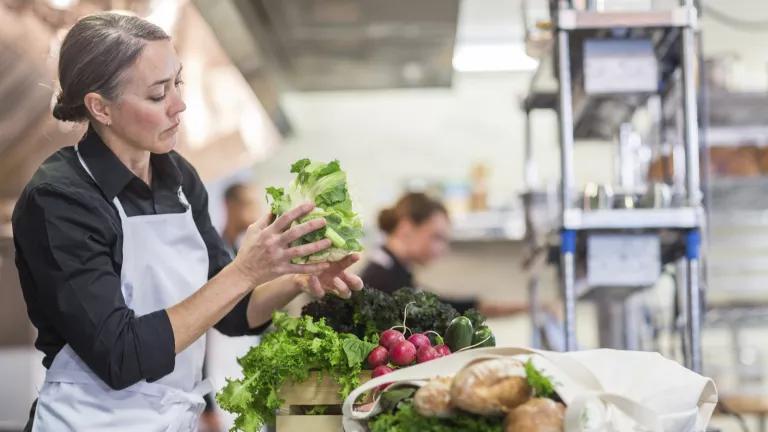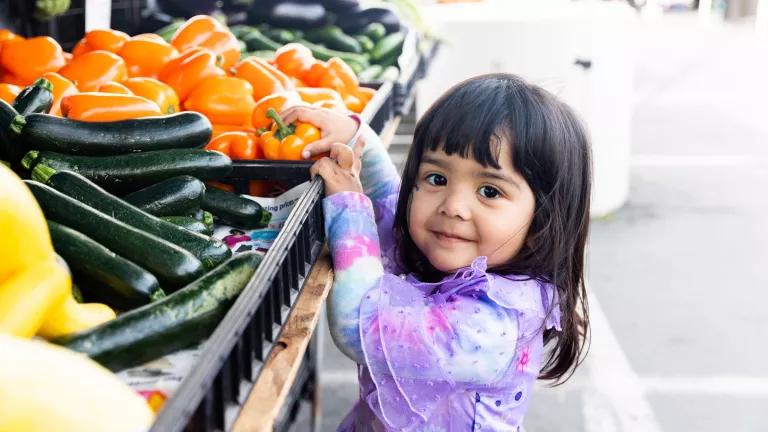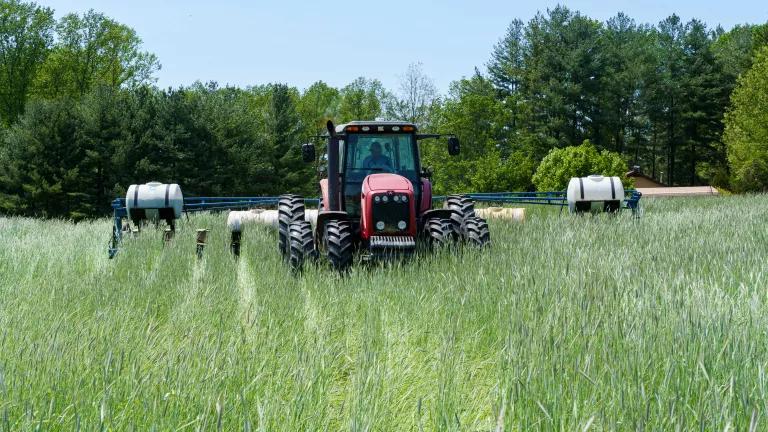Serving up a safer food system: celebrating the "Pope of Pork" & meat raised without drugs
In the livestock industry, heroes don’t always get their due. Perhaps that’s because the story of our modern animal agriculture system is so often so bleak—for farmers, animals, our health and the health of our environment.
In the U.S. pork sector, two-thirds of hog production comes from producers working under contract with mega-processors like Smithfield and Cargill. Processing is increasingly automated and farmers feel the pressures of high volume, low cost meat production. In confined animal feeding operations or “CAFOs”, pigs live by the hundreds or thousands in superbug-breeding warehouses, crowded with pens and gestation crates as far as the eye can see. Hogs are raised for maximum weight gain and routinely given antibiotics to speed up growth and prevent the very kinds of diseases that spread when so many animals live in such close, unsanitary and stressful quarters.
The pork industry is not alone. Did you know that millions of pounds of antibiotics are used in U.S. factory farms every year? Sales of antibiotics for use in livestock production reached record highs in 2011, with four times the amount of antibiotics going to chickens, pigs, and cows that aren’t sick than to people who are—the vast majority used essentially as a substitute for better management practices.
But the really scary part is what happens next. Fed to animals at low levels day after day, the antibiotics kill the weakest bacteria, leaving behind the bacteria that are hardest to kill. It’s like millions of animals are not “finishing their course” of antibiotics, the way our doctors instruct us to do when they prescribe antibiotics to us.
These drug-resistant bacteria multiply and become “superbugs” that can’t be knocked out by ordinary medicines. Superbugs spread from feedlots on workers, through water, air and on meat, putting millions of people at risk of getting seriously ill. If a child catches one of these, a simple ear infection could put her in the hospital – or worse. At the same time, few new antibiotics are being developed. No less a public health authority than the Director General of the World Health Organization recently warned about a “post-antibiotic era”, in which things “as common as strep throat or a child’s scratched knee could once again kill.”
But there is a silver lining. Actually, there are thousands of them. Thousands of farmers from coast to coast are showing that there’s a better, more sustainable, and profitable way to produce meat without reliance on antibiotics. Today, I’m so proud that NRDC is honoring one such farmer: Russ Kremer, winner of the 2013 Growing Green Award in the Food Producer Category. Russ and these other food leaders give us new models of hope.
Known as the “Pope of Pork” (read Barry Estabrook’s feature “The New Pork Gospel” to find out why), Russ is a fifth-generation pork producer and now a driving force in the movement for more sustainably-raised, antibiotic-free livestock. But it wasn’t always this way.
Notice: this is a pretty terrific story.
Fresh from college in the early 1980’s, Russ opened a CAFO in Missouri with the goal of increasing his pig yield. His animals were tightly confined and injected with antibiotics day after day. Then, one day in 1989, Russ was gored by one of his 700-pound Yorkshire boars and contracted an antibiotic-resistant infection that sent him to the hospital to fight for his life. The same aggressive, drug-resistant superbug that had been bred on his farm because of his production methods nearly killed him.
Realizing the dangers of how he had been raising pigs, Russ made a big change. He exterminated his herd and started fresh on a 150-acre farm in Frankenstein, Missouri, raising diversified heirloom pigs. Taking lessons from his grandfather’s generation, Russ designed a natural feeding program: free of antibiotics, meat byproducts, steroids, or any unnecessary chemicals or additives. He built pig housing that incorporated deep bedding, natural ventilation, and lots of space for his hogs to move around, as well as paddocks to rotationally graze pigs on meadows and woodlands.
Today, Russ raises livestock in a sustainable, holistic, and diversified operation that prioritizes animal welfare, human health and ecology. Here’s what life on Russ’s farm looks like:
Russ is proud that his pigs have been drug-free for over 25 years. According to Russ, after weaning, his pigs survive at a rate of nearly 99 percent and rarely get sick. He’s also virtually eliminated the $16,000 he was previously spending each year in veterinarian and animal treatment-related costs.
But Russ didn’t stop with his own farm. He was determined to prove that this type of sustainable farming could be profitable and healthier for other pork producers too. He organized the Ozark Mountain Pork Cooperative, a farmer-owned pork cooperative that now includes 52 farm families and created a small, community-based processing plant in the Ozarks. The original 35 co-op farm families all went through major conversions, transitioning from the antibiotic-dependent CAFO-based model they, like Russ, had been using to raise their livestock without antibiotics. The co-op, with their brands Heritage Acres and Fork in the Road, has built a profitable, vertically coordinated production, marketing, and distribution system, and cultivated relationships with major retailers and restaurant chains across the country. Didn’t I tell you it’s a terrific story?
While antibiotics are essential to modern medicine, they are not essential to livestock production. Russ and his fellow farmers are living proof that we can produce meat in ways that don’t require massive reliance on these precious miracle drugs.
Here’s Russ in his own words on his Growing Green Award win:
“I share this NRDC honor with farmers who have had the courage to buck dangerous conventional production trends by transforming their raising operations into models of hope. These producers are living proof that we can grow profitable and sustainable food production systems that put health first and preserve the efficacy of life-saving medicine, while also treating animals humanely.”
The honor is all ours, Russ. Congratulations from all of us here at NRDC!



